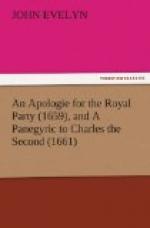But if the essential end of Rulers be the Common peace, and their Lawes obliging as they become relative: Restore us then to those under which we lived with so much sweetness and tranquility, as no age in the World, no Government under Heaven could ever pretend the like. And if the People (as you declare) are to be the Judges of it, summon them together in a Free Parliament, according to its legal Constitution; or make a universal Balott, and then let it appear, if Collonel Lambert and half a dozen Officers, with all their seduced Partizans, make so much as a single Cypher to the Summe Total. And this shall be enough to answer those devious Principles set down in the porch of that specious Edifice; which being erected upon the Sand, will (like the rest that has been daubed with untempered mortar) sink also at the next high wind that blowes upon it. But I am glad it is at last avowed, upon what pretexts that late pretended Parliament have pleaded on the behalf of themselves and party, their discharge from all the former Protestations, Engagements, solemn Vowes, Covenants, with hands (as you say) lift up to the most high God, as also their Oaths and Allegiance, &c. because I shall not in this discourse be charged with slandering of them, and that the whole World may detest the Actions of such perfidious Infidels, with whom nothing sacred has remain’d inviolable.
But there is yet a piece of Artifice behind, of no less consequence then the former, and that is, a seeking to perswade the present Army, that They were the men, who first engaged thus solemnly to destroy the Government under which they were born, and reduce it to this miserable condition: whereas it is well known by such as converse daily with them, that there is hardly one of ten amongst them, who was then in Armes; and that it was the Zelots under Essex, and the succeeding Generals, who were the persons whose perfidiousness{2} he makes so much use of, and that the present Army consists of a far more ingenuous spirit, and might in one moment vindicate this aspersion, make their conditions with all advantage, and these Nations the most happy People upon the Earth, as it cannot be despaired but they will one day do, when by the goodness of Almighty God, they shall perfectly discern through the mist which you have cast upon their eyes, lest they should discover the Imposture of these Egyptian Sorcerers.
And now, Sir, if after all this injustice, and impiety on your parts, you have prosecuted that with the extreamest madness, which you esteemed criminal in your enemies, viz. To arrogate the supream power in a single person;{3} condemn men without Law; execute, and proscribe them with as little: Imprest for your Service, violate your Parliaments, dispense with your solemn Oaths; in summe, to mingle Earth and Heaven by your arbitrary proceedings: All which, not only your printed books, this pretended




